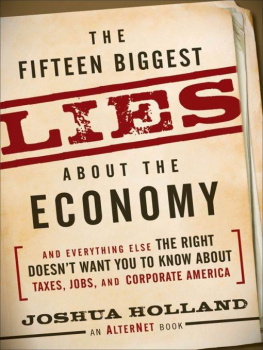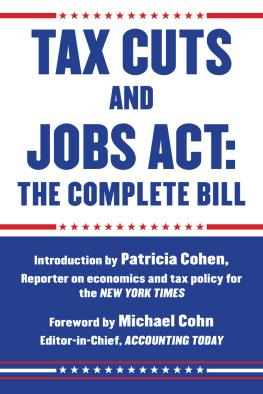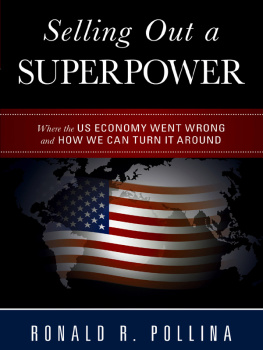Table of Contents
Copyright 2010 by John Wiley & Sons, Inc. All rights reserved
Published by John Wiley & Sons, Inc., Hoboken, New Jersey Published simultaneously in Canada
Cartoon credits: page 20 Tom Tomorrow; page 59 Lloyd Dangle; page 158 Matt Bors.
No part of this publication may be reproduced, stored in a retrieval system, or transmitted in any form or by any means, electronic, mechanical, photocopying, recording, scanning, or otherwise, except as permitted under Section 107 or 108 of the 1976 United States Copyright Act, without either the prior written permission of the Publisher, or authorization through payment of the appropriate per-copy fee to the Copyright Clearance Center, 222 Rosewood Drive, Danvers, MA 01923, (978) 750-8400, fax (978) 646-8600, or on the web at www.copyright.com. Requests to the Publisher for permission should be addressed to the Permissions Department, John Wiley & Sons, Inc., 111 River Street, Hoboken, NJ 07030, (201) 748-6011, fax (201) 748-6008, or online at http://www.wiley.com/go/permissions.
Limit of Liability/Disclaimer of Warranty: While the publisher and the author have used their best efforts in preparing this book, they make no representations or warranties with respect to the accuracy or completeness of the contents of this book and specifically disclaim any implied warranties of merchantability or fitness for a particular purpose. No warranty may be created or extended by sales representatives or written sales materials. The advice and strategies contained herein may not be suitable for your situation. You should consult with a professional where appropriate. Neither the publisher nor the author shall be liable for any loss of profit or any other commercial damages, including but not limited to special, incidental, consequential, or other damages.
For general information about our other products and services, please contact our Customer Care Department within the United States at (800) 762-2974, outside the United States at (317) 572-3993 or fax (317) 572-4002.
Wiley also publishes its books in a variety of electronic formats. Some content that appears in print may not be available in electronic books. For more information about Wiley products, visit our web site at www.wiley.com.
Library of Congress Cataloging-in-Publication Data:
Holland, Joshua.
The fifteen biggest lies about the economy : and everything else the right doesnt want you to know about taxes, jobs, and corporate America / Joshua Holland.
p. cm.
Includes bibliographical references and index.
ISBN 978-0-470-64392-1 (pbk.); ISBN 978-0-470-64392-1 (ebk); ISBN 978-0-470-91280-5 (ebk); ISBN 978-0-470-91282-9 (ebk)
1. United StatesEconomic policy2009- 2. United StatesEconomic conditions2099- 3. Rights and left (Political science)United States. 4. ConservatismUnited StatesHistory21st century. I. Title.
HC106.84.H65 2010
330.973dc22
2010028343
Acknowledgments
Without all of the support my family has given me over the years, I wouldnt be able to do a job I love. Im deeply appreciative. I owe a special debt of gratitude to my father, John Holland, who read the following chapters and offered me spot-on feedback. Without his help, I doubt that this book would have been possible.
Im also grateful to Don Hazen, my boss at AlterNet, for giving me the chance to work on this project, to Eric Nelson at Wiley for making it happen, and to Wileys Rachel Meyers, whose copyediting turned out to be much more than that.
Thanks also to Tom Tomorrow, Lloyd Dangle, and Matt Bors, for their razor-sharp editorial cartoons, and to Larry Beinhart for the perfect excerpt to accompany chapter 5.
INTRODUCTION
How our conventional wisdom fails us
Hope and change were in the air on that cold January day when Barack Obama was sworn in as the nations first African American president. But there was also a darker shadow looming. Our economy lay in ruins, and the American people were mad as hell.
They had every reason to be. Unemployment was approaching 8 percent and rising. Theyd seen their retirement funds dry up and their home values tank. Theyd funded an enormous bailout of the banking industry, only to see Wall Streets movers and shakers earn fat bonuses just as they had in better times. The wisdom of the pundits, the experts, and the prognosticatorsthe high priests of the global economyturned out to be woefully wrong. The nations elites had been exposed as disastrously incompetent managers, yet their own positions of comfortable privilege had, by and large, remained secure.
Everyone agreed that things were bad, but who was to blame? What exactly had happened to our sense of economic security?
Since that day, many Americans, from across the political spectrum, have gone from hopping mad to spitting mad . Progressives not only became disenchanted with the GOPs obstructionism, but also blamed the administration for dropping the ball. Many felt that the hopey-changey promises that candidate Obama had made on the stump had been abandoned. Some said that the administration hadnt really fought the good fight it had promised or hadnt fought it well.
But the really juicy anger was on the Rightthe kind of dramatic, often over-the-top anger the media love, complete with misspelled signs suggesting that the new president was a socialist who hadnt been born in this country. The Tea Parties had arrived, and they captured the imagination of the chattering class during 2009 and 2010. The pundits debated whether they represented a spontaneous uprising of ordinary, apolitical people awoken from their slumber by the coming of the econopocalypse and the bailouts given to Wall Street and Detroit. Were they salt-of-the-earth moderates inflamed by fear of runaway government spending, or were they a bunch of wing-nuts who had no coherent ideological beliefs but were simply responding to some good old-fashioned racist dog whistles?
What was striking about these debates is that they often began with the premise that whatever else the Tea Partiers might be, their economic concerns were valid. Yet it was apparent that although their economic pain and anxiety were all too real, their analysis of what caused it was nothing short of insane. It was a movement whose members lived in a parallel universe, embracing wild conspiracy theories about how ACORN and MoveOn.org had brought down the global economy to advance their radical agendas. They saw creeping socialism in the most benign government programs. It was a movement whose views reflected the simmering paranoia of its intellectual muse, Fox News host Glenn Beck.
More important, it was a movement that had only a tenuous grasp on the role that government plays in our society. In 2009, an enraged constituent at a town hall meeting in South Carolina yelled at Republican representative Bob Inglis to keep your government hands off my Medicare! Another woman reportedly sent a letter to the White House stating in no uncertain terms, I dont want government-run health care, I dont want socialized medicine and dont touch my Medicare.
In 2010, National Public Radio did a fawning profile of Liberty Belle, aka Keli Carender, one of the founders of the Tea Party movement. When asked why her congressmans support for healthcare reform had so enraged her, she summed up the Tea Party rhetoric pretty well. I tried to boil down in essence what makes me so angry about it, Carender told NPR. And it was this idea that he and other people decide what the needs are in society. They get to decide. But in order to fund those things, they have to take from some people in order to give to the other people. What NPR didnt tell its audience is that Carender, an actress, had done six shows for a Seattle theater company that had received a Washington State arts grant, and had worked on a research project funded by the National Science Foundation before that.






